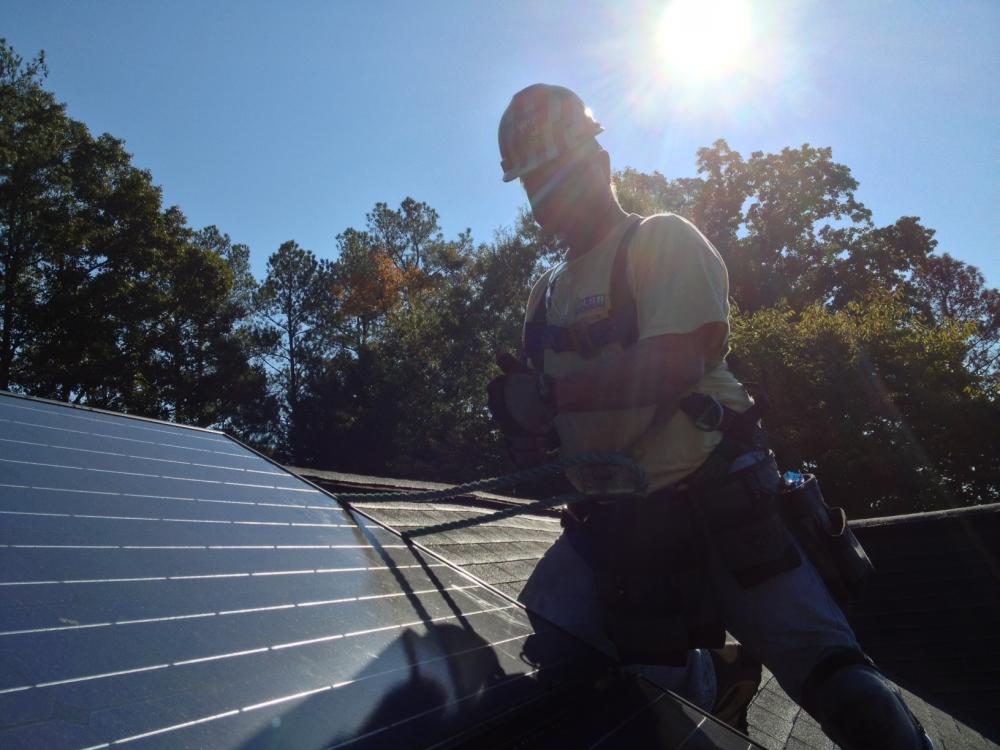
Section Branding
Header Content
Solar power net metering got a boost. But incentives still lag for many homeowners, advocates say
Primary Content
LISTEN: GPB's Peter Biello speaks with Georgia Tech's Marilyn A. Brown about solar energy and net metering in Georgia.

Getting solar panels installed on your home can decrease your carbon footprint, but it can be expensive. One way to lower that cost is by selling some of the excess power generated by those panels back to the grid. That's called net metering. But there are limits on how much you can be paid for that electricity. And recently, clean energy advocates were disappointed by the Public Service Commission's regulatory decisions for net metering for the coming year. GPB's Peter Biello spoke with Dr. Marilyn Brown, a professor of sustainable systems in the School of Public Policy at Georgia Tech.
Peter Biello: You were advocating recently for Georgia Power to pay people who generate electricity at home the same price per kilowatt as Georgia Power charges its customers. But that did not happen. Can you tell us what happened instead?
Marilyn A. Brown: What happened is that the commission elected to settle on a value for the buyback rate of 6.68 cents per kilowatt hour, which is halfway between the old buyback rate of 2.3 cents per kilowatt hour and the current retail rate of perhaps 13 cents per kilowatt hour. So they settled on a kind of a in-between, middle-of-the-road approach because I think that they were not certain and they had to compromise.
Peter Biello: And you're saying it's a little disappointing, in part, because if people who put solar panels in their home get more money for the excess power that they generate, more than Georgia Power is currently planning to pay, more people might decide to install solar panels, which would reduce the state's overall greenhouse gas emissions?
Marilyn A. Brown: That's correct. So the cost of solar systems has been coming down exponentially. Actually, it's been a great success story, but it's still costly. You have to pay some tens of thousands — $10,000, let's say maybe — and you have to pay it back from savings from selling power to Georgia Power. [If the rate] is cut in half, it's going to take you much, much longer to pay off the upfront capital cost.
Peter Biello: Is the Public Service Commission's decision on this indicative of the state's push overall for a focus on larger solar rather than individual homeowners putting panels somewhere on their property?
Marilyn A. Brown: I think so, because the rate of return on investments by the Georgia Power Company or other utilities get a pretty good return when it's a utility-scale solar farm. But when the individual homeowner is using their capital and they're getting the payback, the power company doesn't get the same rate of return. So there's a differential. They're not as motivated to help us as homeowners.
Peter Biello: While we're talking about money, let's talk about other incentives. The Inflation Reduction Act has some subsidies for solar installations, some tax credits. How strong are those when it comes to incentivizing homeowners to install solar panels?
Marilyn A. Brown: There is a 30% investment tax credit, but that investment tax credit has been around since the year 2005, and it has not driven solar into the marketplace on rooftops in Georgia. It's positive. It's important. I'm glad we have it. It might make a difference for middle and upper middle homeowners, but it doesn't enable those who are resource-constrained to justify the purchase of solar on their homes.
Peter Biello: These rates won't be revisited again for another three years. And you've said that there's missing data here that would make the case stronger, data that would show to the regulators that people who have solar panels actually cost utilities less to serve. In between now and the next time these rates are evaluated, will advocates, scientists, people who study solar be collecting data on how much it costs for people with solar in Georgia to be served by entities like Georgia Power?
Marilyn A. Brown: I don't think that the public advocates will be doing that. I think that Georgia Power will be encouraged to do that. They're really in the best position with data on their own customers. That's what you need. We can't do it from afar, you know, as analysts sitting in our offices. We need the data. So I think they'll be encouraged to do that. I'm optimistic. We pointed out this gap, and I believe that it'll be filled. I'm hopeful.

